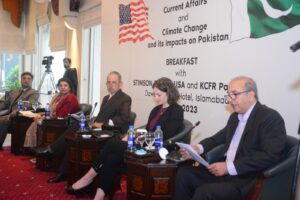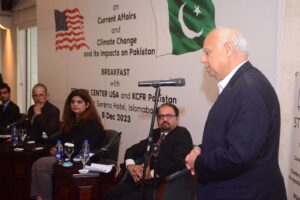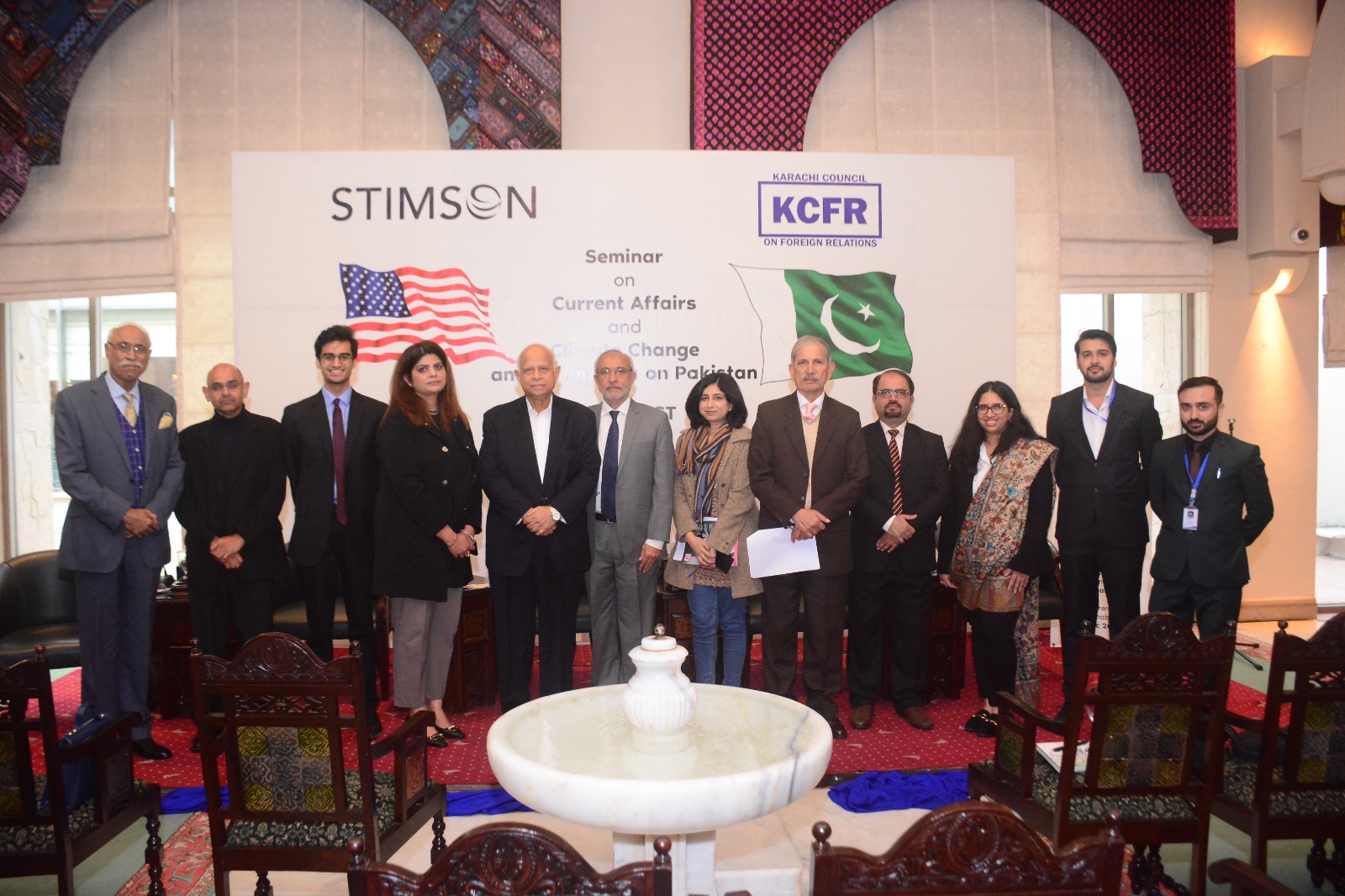WNAM Report: The Karachi Council on Foreign Relations (KCFR) collaborated with a distinguished delegation from the Stimson Center, USA, headed by Ms Elizabeth Threlkeld, for a seminar addressing Current Affairs and Climate Change and its Impact on Pakistan. The event featured two insightful sessions centred around the geopolitical landscape and the pressing matter of climate change.
The seminar commenced with an opening address from Air Marshal (R) Masood Akhtar, the distinguished moderator of the event on behalf of Commodore (R) Sadeed Malik CEO of KCFR and the chairperson of KCFR Ms Nadira Panjwani.
Air Marshal (R) Masood AkhtarHe underscored Pakistan’s strategic importance amid the ongoing global transformation. Emphasizing the nation’s crucial geopolitical position at the intersection of Central Asia, the Middle East, and South Asia, he drew attention to Pakistan’s role as a pivotal player in influencing regional and international affairs. The changing geopolitical landscape worldwide was recognized, and Pakistan’s distinctive position was highlighted as a continued and essential factor in shaping diplomatic interactions, promoting regional stability, and nurturing economic partnerships.
Dr. Adil Sultan, Acting Dean and Head of Faculty of Aerospace and Strategic Studies at Air University, served as the keynote speaker. The distinguished panelists included Ms Elizabeth Threlkeld, Mr Faheem Sardar, and Dr Shabana Fayyaz.
The initial session, focusing on current affairs, showcased Dr. Adil Sultan as the keynote speaker. Dr Sultan delved into persistent challenges in US-Pakistan relations, the changing regional landscape, and the ramifications of India aligning with the US-led anti-China alliance. He highlighted ongoing issues in US-Pakistan relations, referencing the term “disenchanted allies” coined by Dennis Cux in 2001. Despite historical ties, trust issues persist due to divergent security interests and unrealistic expectations. Dr. Sultan underscored the evolving regional and geo-strategic landscape post-US withdrawal from Afghanistan. The Indo-Pacific strategy, designed to contain China, presents challenges for smaller nations like Pakistan in balancing relations with major players.
Moreover, India’s alignment with the US-led anti-China alliance and the redefinition of South Asia as ‘Southern Asia’ complicate regional dynamics, impeding bilateral risk reduction and confidence-building measures. Dr Adil drew attention to the matured India-US strategic partnership, highlighting the fruition of the 2004 NSSP initiative, granting India access to sensitive technologies. Recent bilateral agreements, including iCET in 2022, raise concerns for Pakistan’s national security, particularly in the context of India’s evolving war doctrines.
Internal challenges, such as political instability and governance issues, further exacerbate Pakistan’s security concerns. Dr Sultan emphasized the existential threat of climate change, urging the adoption of climate-resilient strategies. Expressing apprehension about the “geopolitics vs geoeconomics” debate, he cautioned against overemphasizing geo-economics without stable domestic economies and peaceful neighbourhoods.
He underscored the potential consequences of an arms race between the US and India, calling on nations supporting India’s military capabilities to consider the implications for regional stability. In his concluding remarks, he urged responsible state behaviour, emphasizing the need to address potential future crises between India and Pakistan. The speech serves as a call to action for a strategic reassessment in the region to prevent uncontrollable conflicts.
Ms Elizabeth Threlkeld highlighted that the year 2024 is going to change the dynamics of the world as elections are going to be held in several countries of South Asia and also in the USA. There will be a significant impact on the South Asian region, she maintained that a peaceful and prosperous Pakistan is needed and we all wish for it. Pakistan and the US must work together to improve strategic relations and bilateral relations to make the most of the year ahead.
The second session, focusing on ‘Climate Change and its Impact on Pakistan,’ featured Mr Shahbaz Mehmood as the keynote speaker. Other panellists included Ambassador Nadeem Riaz, Ms Saira Ijaz and Mr Uzair Sattar.
Mr. Mehmood delivered a thorough analysis of climate change, underscoring its existential threat to humanity. He explored global warming targets, Pakistan’s vulnerability, and the nation’s commitment to climate action, including ambitious emission reduction goals within the framework of the Paris Agreement. Mr Mehmood emphasized the crucial role of active involvement from all stakeholders in addressing Pakistan’s climate crisis.
In a thought-provoking address, the keynote speaker, Mr Shahbaz Mehmood, delved into the critical issue of climate change and its profound impact on Pakistan. Characterizing climate change as the paramount challenge of the 21st century, he stressed its existential threat to humanity. Mr Mehmood noted that the global mean temperature has already exceeded a 1-degree increase since the pre-industrial era, with each successive decade being warmer than the preceding ones. Global climate models project that without substantial reductions in greenhouse gas emissions, global warming targets of 1.5°C and 2°C will be surpassed by the end of the 21st century. Quoting the Intergovernmental Panel on Climate Change (IPCC), Mr Shahbaz stressed the urgency of curbing carbon emissions by at least 49% of 2017 levels by 2030 and achieving carbon neutrality by 2050 to limit global warming below 2°C.
He pointed out that climate impacts are more severe and widespread than expected, with developing nations, including Pakistan, particularly vulnerable due to their heavy dependence on agriculture and limited technological capacity. Pakistan consistently ranks among the top ten countries most affected by climate change, as highlighted in the global climate risk index published by German Watch. Discussing Pakistan’s climate scenario, Mr Mehmood revealed that the country has experienced a 0.6°C increase in average temperature over the last century, in line with the global trend. Future projections indicate a 1°C higher temperature rise in Pakistan compared to the global average by the end of the century, with northern regions facing more significant warming than the southern parts. The keynote speaker linked the temperature rise to adverse impacts, including the increasing frequency of extreme events, glacier regression, and changes in rainfall patterns. He recounted recent climate-induced disasters in Pakistan, such as floods, heatwaves, Glacier Lake Outburst Flood (GLOF) events, and cyclonic activity, causing loss of life and significant economic damage.
Highlighting Pakistan’s commitment to climate action, Mr. Shahbaz mentioned the country’s National Adaptation Plan (NAP) as a proactive step toward a resilient and sustainable environment. He stressed the importance of active involvement from all stakeholders in addressing Pakistan’s climate crisis. Addressing emission reduction goals under the Paris Agreement, Mr Mehmood revealed Pakistan’s ambitious aim of a 50% reduction in projected emissions by 2030. This includes a 15% drop below business as usual (BAU) from the country’s resources and an additional 35% drop below BAU subject to international financial support. To achieve this, Pakistan plans to shift to 60% renewable energy, increase the share of electric vehicles (EVs) to 30% by 2030, ban imported coal, and invest in nature-based solutions. However, he highlighted the need to strengthen scientific and technical capacities to reach these transition targets. In his concluding remarks, Mr Mehmood emphasized the importance of factoring climate risks, vulnerability, and adaptation measures into decision-making across all levels of governance to achieve climate-resilient development.
The seminar concluded with closing remarks by Mr Ikram Sehgal, Patron-in-Chief of KCFR and Co-Chairman of Pathfinder Group. Mr Sehgal turned his attention to concerns on the economic front and challenged the notion of failure, citing recent financial data. He pointed out that, based on charts from the past few years, virtually every bank and company has been profitable. However, he acknowledged that a few banks have not declared significant profits, attributing these challenges to misguided policies influenced by external forces. Mr Sehgal emphasized the need to rectify these issues and highlighted the failure to take effective measures against both illegal and legal foreign exchange companies as a fundamental problem. He urged the government to address these policy shortcomings, emphasizing that corrective actions in these areas could pave the way for a positive trajectory in the economic landscape.
The seminar’s distinctive aspect lay in the involvement of government officials, professors, the business community, think tanks, and representatives from civil society and the development sector. The goal was to convene all stakeholders in a single forum to deliberate on crucial matters about current affairs and climate change. The discourse proved insightful, with each panelist contributing valuable knowledge and sharing their experiences.


